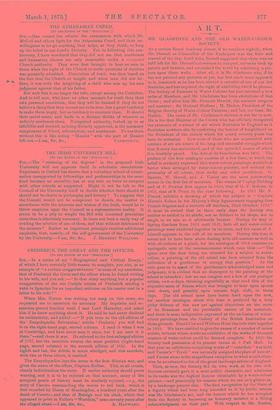FREDERICK THE GREAT AND THE OFFICER.
[TO THE EDITOR OF TEE " SPECTATOR:] SIR,—In a notice of my "Biographical and Critical Essays," of which I have certainly little reason to complain, you cite, as an example of "a certain exaggerativeness " in some of my anecdotes, that of Frederick the Great and the officer whom he found writing to his wife, and you ask :—" Is that story anything but a popular exaggeration of the one Carlyle relates of Frederick sending a valet to Spandau for an impudent criticism on his master sent in a letter to his wife ? "
When Mrs. Norton was writing her song on this story, she requested me to ascertain its accuracy. My inquiries and re- searches proved fruitless until I met Lord Macaulay, and asked him if he knew anything about it. He said he had never doubted its authenticity, and added :—" If you turn to the old edition of the Encyclopmdia Britannica,' article Frederic,' you will find it on the right-hand page, second column. I read it when I was at Cambridge, and have never seen it since, but I am sure it is there,"—and there it was. He referred to the first enlarged edition of 1797, but the anecdote retains the same position (right-hand page, second column) in the seventh edition of 184S. In the eighth and last, the article is much abridged, and this anecdote, with two or three others, is omitted.
The Encyclopmdist lays the scene in the first Silesian war, and gives the name of the officer, Captain Zielber. This, at all events, clearly individualises the story. If earlier authority should prove wanting, and it is to be rejected on that account, many of the accepted pearls of history must be similarly rejected, —e.g., the story of Canute commanding the waves to roll back, which is first recorded by Henry of Huntingdon, a hundred years after the death of Canute ; and that of Raleigh and his cloak, which first appeared in print in Fuller's "Worthies," some seventy years after
the alleged event.—I am, Sir, &c., A. HavwAvuo.


































 Previous page
Previous page